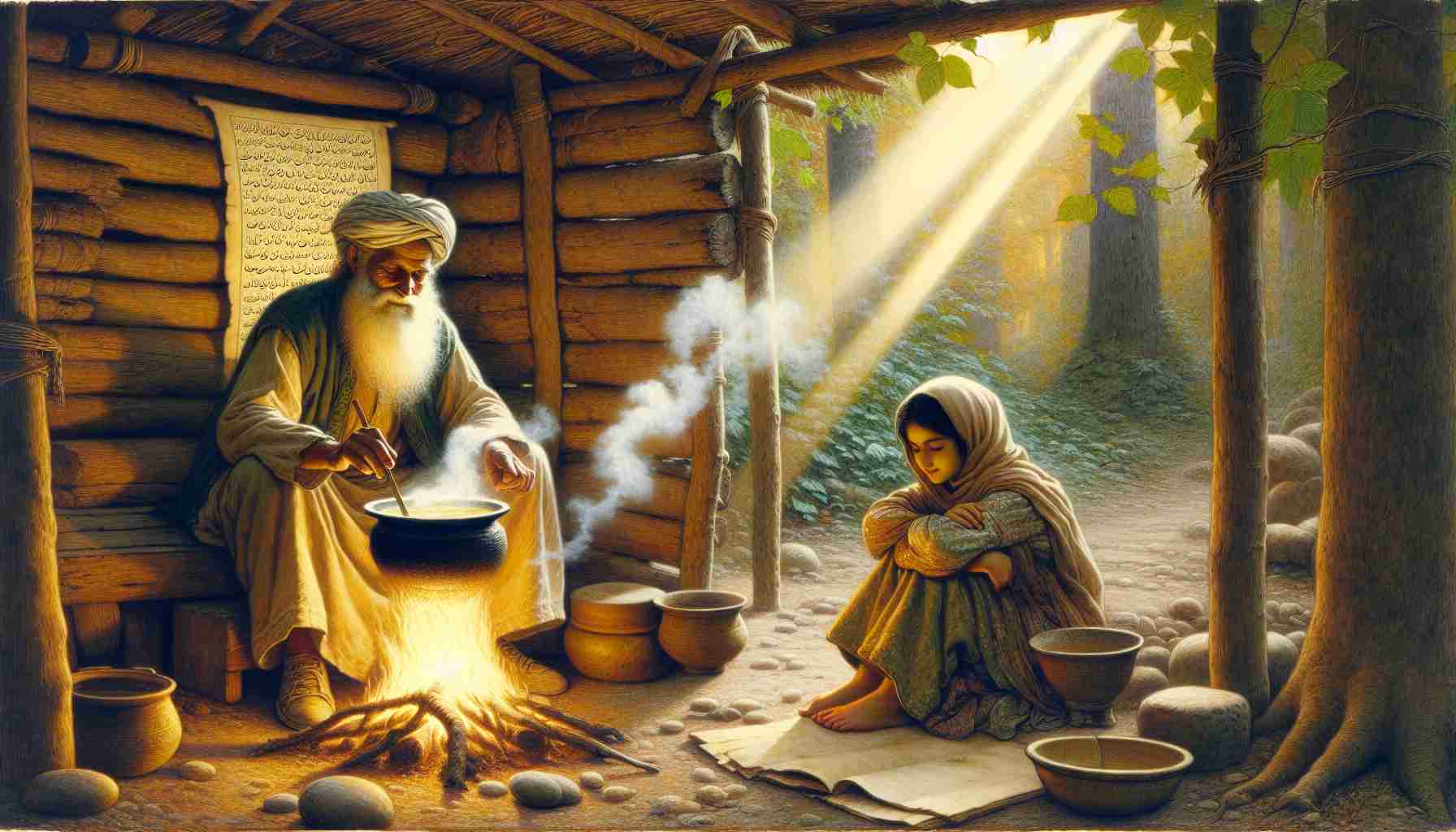

It was the smell of broth that stopped me. A strong, warm fragrance drifted from a tiny hut in the forest. My legs were tired from walking all morning, and my belly grumbled like thunder. I followed the scent.
Inside the hut, an old man stirred a pot with a long wooden spoon. He wore plain robes and had long, white eyebrows that drooped over sharp eyes.
"Come in, traveler," he said, without looking at me. "The soup needs no invitation. Neither do you."
I stepped inside, feeling a little nervous. “What are you making?” I asked.
“Just soup,” he replied.
“But it smells like something more than just soup.”
The old man smiled and motioned for me to sit. “Some say the best recipes are written. But this one is a page with no words.”
I blinked. “A page... with no words?”
He chuckled. “Yes. The best things can’t be written down. They must be felt, lived, tasted.”
I watched him cook. He didn’t measure anything. He didn’t taste or adjust. He moved like a dancer—slow and smooth. Every action had purpose, but none looked forced. It was like the soup made itself.
“Are you a chef?” I asked.
“Long ago, I was many things,” he said. “Now, I just follow Tao. The Way.”
I had heard of Tao before. People in the village spoke of balance, of living simply. But I didn’t understand it—until that moment.
“Don’t you need a recipe?” I asked.
He shook his head. “The Tao isn’t a list of steps. It’s like water. It flows where it must, without trying.”
As we sat, I began to see.
There was no fuss. No rush. He didn’t worry whether the soup was perfect. He just let the ingredients be what they were—carrot, root, salt. No more, no less.
When he handed me a bowl, I expected something magical. But the taste was quiet, soft. Nothing loud. Just warm. Real.
“This is... peaceful,” I said.
He nodded. “Freedom comes when you stop trying to control every flavor.”
I stared at my bowl. I thought about how hard I’d been trying in life—to be better, to do more, to understand everything.
For once, I said nothing. I just ate.
Outside, the wind passed through the trees. The soup warmed my belly. I didn’t need to ask questions anymore.
“Not everything has to be spoken,” the man said gently.
When I left the hut, the sun peeked through the clouds. I didn’t take notes. I didn’t memorize ingredients.
But I remembered the feeling.
I didn’t change overnight. But now, when I try too hard or worry too much, I remember that page with no words. I breathe. I let go. And I try to live like the soup—simple, flowing, free.
It was the smell of broth that stopped me. A strong, warm fragrance drifted from a tiny hut in the forest. My legs were tired from walking all morning, and my belly grumbled like thunder. I followed the scent.
Inside the hut, an old man stirred a pot with a long wooden spoon. He wore plain robes and had long, white eyebrows that drooped over sharp eyes.
"Come in, traveler," he said, without looking at me. "The soup needs no invitation. Neither do you."
I stepped inside, feeling a little nervous. “What are you making?” I asked.
“Just soup,” he replied.
“But it smells like something more than just soup.”
The old man smiled and motioned for me to sit. “Some say the best recipes are written. But this one is a page with no words.”
I blinked. “A page... with no words?”
He chuckled. “Yes. The best things can’t be written down. They must be felt, lived, tasted.”
I watched him cook. He didn’t measure anything. He didn’t taste or adjust. He moved like a dancer—slow and smooth. Every action had purpose, but none looked forced. It was like the soup made itself.
“Are you a chef?” I asked.
“Long ago, I was many things,” he said. “Now, I just follow Tao. The Way.”
I had heard of Tao before. People in the village spoke of balance, of living simply. But I didn’t understand it—until that moment.
“Don’t you need a recipe?” I asked.
He shook his head. “The Tao isn’t a list of steps. It’s like water. It flows where it must, without trying.”
As we sat, I began to see.
There was no fuss. No rush. He didn’t worry whether the soup was perfect. He just let the ingredients be what they were—carrot, root, salt. No more, no less.
When he handed me a bowl, I expected something magical. But the taste was quiet, soft. Nothing loud. Just warm. Real.
“This is... peaceful,” I said.
He nodded. “Freedom comes when you stop trying to control every flavor.”
I stared at my bowl. I thought about how hard I’d been trying in life—to be better, to do more, to understand everything.
For once, I said nothing. I just ate.
Outside, the wind passed through the trees. The soup warmed my belly. I didn’t need to ask questions anymore.
“Not everything has to be spoken,” the man said gently.
When I left the hut, the sun peeked through the clouds. I didn’t take notes. I didn’t memorize ingredients.
But I remembered the feeling.
I didn’t change overnight. But now, when I try too hard or worry too much, I remember that page with no words. I breathe. I let go. And I try to live like the soup—simple, flowing, free.